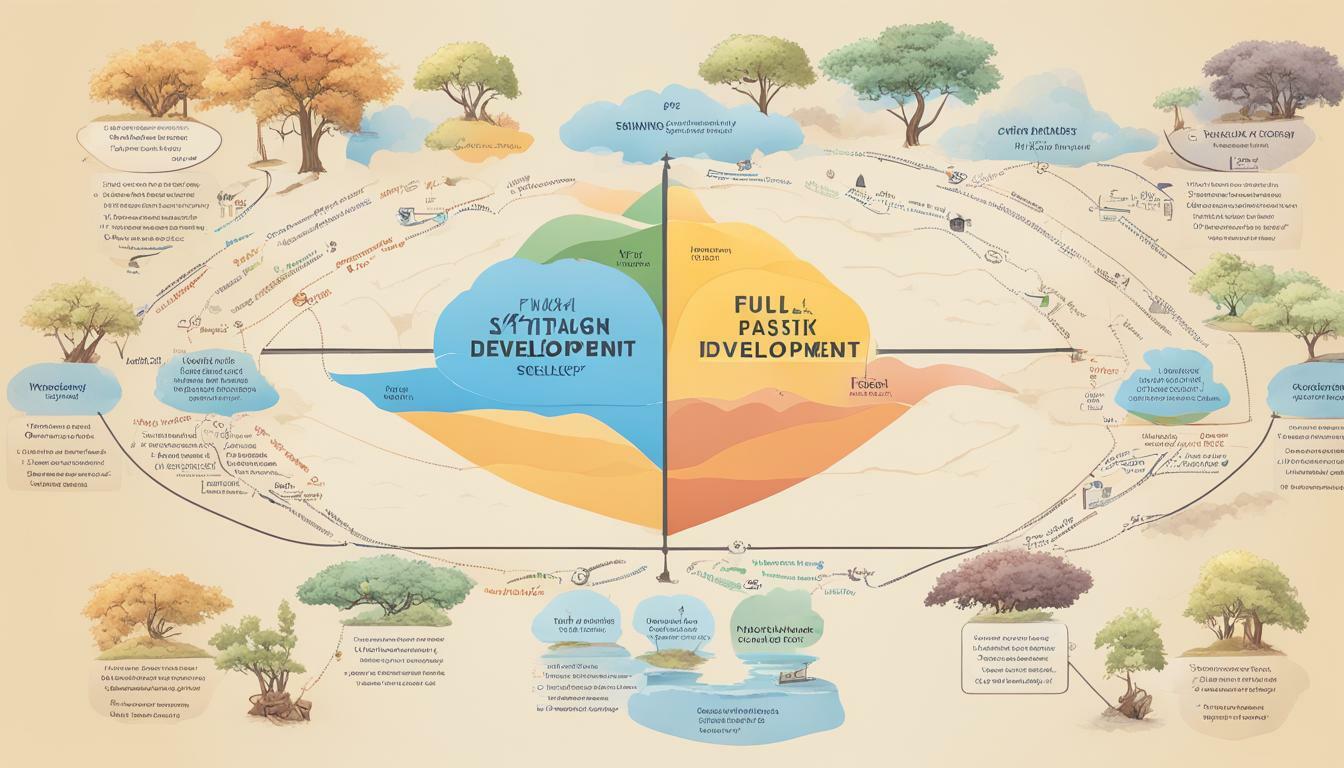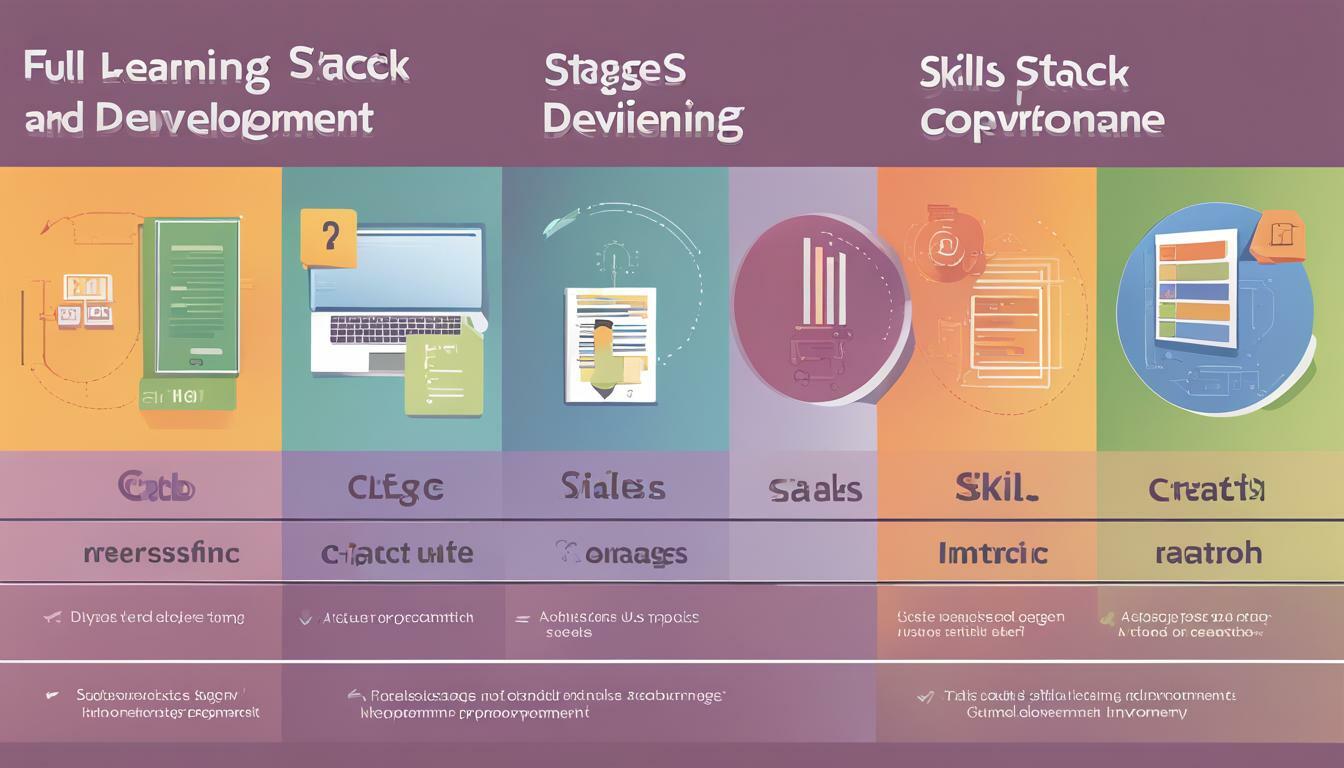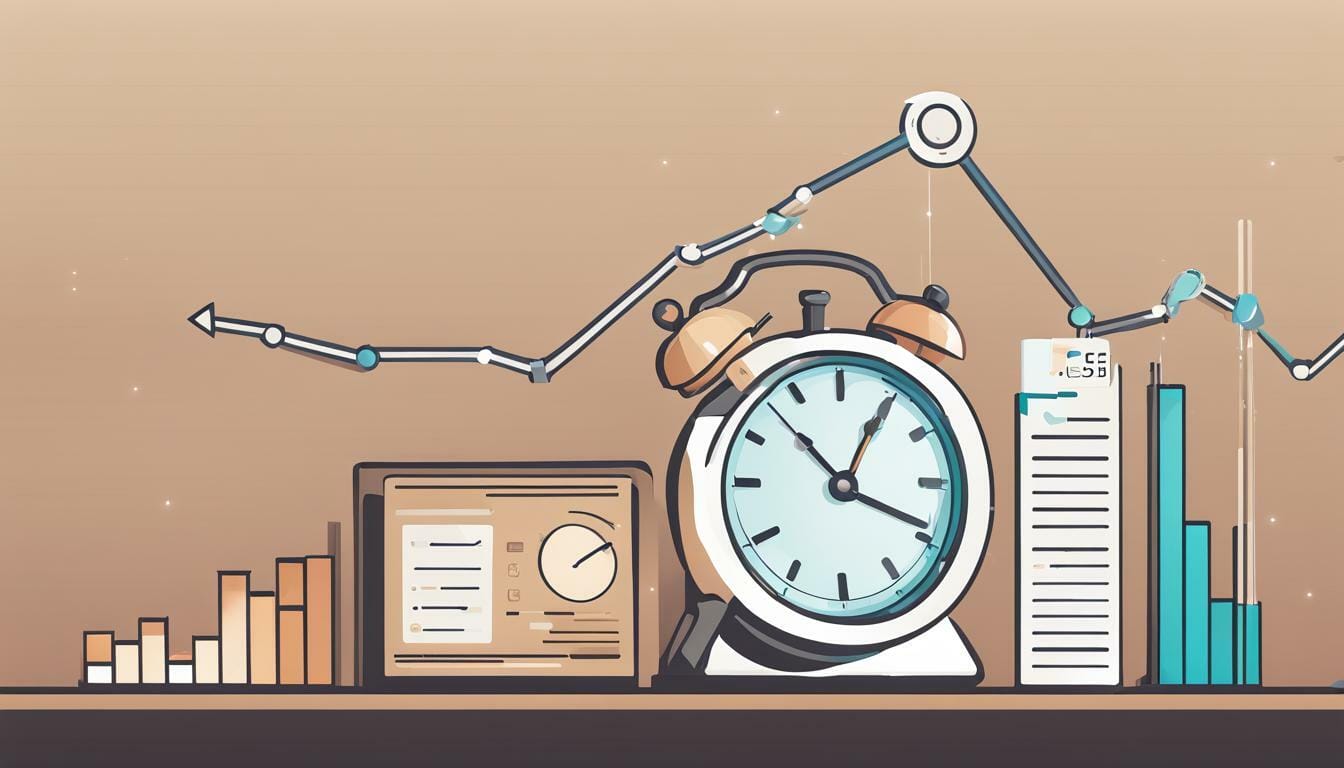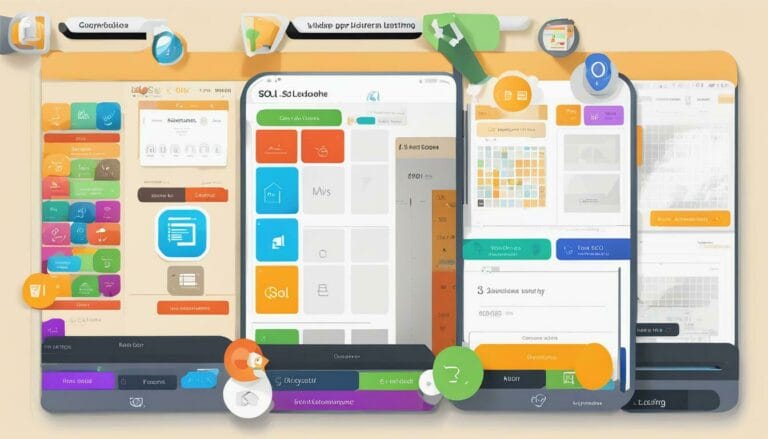Understanding the Duration to Learn Full Stack Development

Gaining proficiency in Full Stack Development, a notable and sought-after ability that spans multiple facets of web development including front-end, back-end, and databases, is an appreciable achievement. Nonetheless, the duration it takes to wholly grasp Full Stack Development could vary, contingent on several factors.
In this section, I will explore the duration it takes to learn Full Stack Development. We will discuss the factors that influence the learning duration and provide an overview of the skills involved. By the end of this section, you will have a better understanding of the estimated duration to acquire Full Stack Development skills.
Key Takeaways:
- Learning Full Stack Development can vary in duration depending on multiple factors.
- Prior programming knowledge, learning methods, and resources can affect the learning timeline.
- Breaking down the learning timeline into different stages can provide an estimated duration for acquiring Full Stack Development skills.
Factors Influencing Learning Duration
In order to estimate the time required to acquire Full Stack Development skills, it is essential to consider the various factors that can influence the learning duration. These may include:
- Previous programming knowledge
- Learning method
- Dedication and study time
- Available learning resources
Having prior programming knowledge can significantly impact the time it takes to learn Full Stack Development. If you are already familiar with programming concepts and have experience with a programming language, you will likely be able to learn Full Stack Development quicker than someone with no prior experience. However, if you’re a beginner, do not be discouraged! Many Full Stack Development courses are designed for beginners and provide a solid foundation.
Learning method can also play a crucial role in the learning duration. Self-learning can be more flexible but may take longer than intensive courses or bootcamps. Available resources, such as online courses or mentorship opportunities, can also impact the learning duration.
In addition, dedication and study time are essential factors. The more time you dedicate to learning Full Stack Development, the quicker you will acquire the necessary skills. Consistency is key, so schedule study time each week and stick to the schedule to see progress!
Overall, the duration of learning Full Stack Development can vary based on a variety of factors. It is essential to take time to research your options and consider what will work best for you and your learning style.

Foundational Programming Knowledge
When it comes to learning Full Stack Development, having a foundational programming knowledge can significantly impact the learning duration. If you are a complete beginner, it is recommended that you start by learning the basics of programming before pursuing Full Stack Development.
Understanding programming fundamentals such as variables, data types, control structures, and functions can make it easier to comprehend Full Stack Development concepts. Moreover, it can help reduce the time required to acquire Full Stack Development skills.
There are several programming languages that you can learn to prepare yourself for Full Stack Development. Some popular options include Python, JavaScript, and Java. These languages have a wide range of use cases and are essential for Full Stack Development.
It is important to note that having prior knowledge of programming is not a strict requirement for Full Stack Development. However, it can help streamline the learning process, making it less intimidating for beginners.

It is recommended that beginners spend at least three months learning programming basics before diving into Full Stack Development. However, this is just an estimated time frame and can vary depending on individual learning speed and dedication.
Learning Method and Resources
When it comes to learning Full Stack Development, the choice of learning method and resources can have a significant impact on the duration it takes to acquire the necessary skills. There are several options available, including self-learning, online courses, bootcamps, and more.
Self-learning: This method involves relying on free online resources such as YouTube tutorials, blogs, and forums to learn Full Stack Development. While it can be an inexpensive way to learn, it can also be time-consuming and may lack organized curriculum and quality feedback.
Online courses: Full Stack Development courses are available on various e-learning platforms such as Udemy, Coursera, and edX. These courses offer structured curriculum, quality feedback, and the flexibility to learn at your own pace. The learning time for these courses can vary, with some courses ranging from a few weeks to several months.

Bootcamps: Full Stack Development bootcamps offer an immersive learning experience that typically lasts for several weeks. These programs are designed to provide hands-on training, career support, and networking opportunities. They can be an expensive option, but they often result in quicker learning outcomes compared to self-learning or online courses.
Other resources: Additional resources such as textbooks, coding challenges, and mentorship programs can also aid in learning Full Stack Development. These resources can complement other learning methods and provide a well-rounded learning experience.
Ultimately, the choice of learning method and resources depends on personal preference, learning goals, and available time and resources. While self-learning may take longer, it can be a cost-effective option. On the other hand, bootcamps may be expensive but offer a comprehensive learning experience that can result in quicker outcomes.
Skillset Required for Full Stack Development
In order to become a proficient Full Stack Developer, one must possess a diverse range of skills. Front-end development involves working with the user interface and creating visually appealing designs. This skill requires knowledge of HTML, CSS, and JavaScript. On the other hand, back-end development involves working with the server and creating functional applications. This requires knowledge of frameworks such as Node.js, Ruby on Rails, or Django.
One must also have a solid understanding of databases, as this is where all information is stored. An understanding of SQL is crucial, as well as knowledge of database management systems like MySQL, MongoDB, or PostgreSQL.
Other essential skills include version control with Git, debugging and testing, APIs, and deployment of applications to cloud platforms like AWS, Heroku, or Azure. It is important to note that becoming an expert in Full Stack Development requires ongoing learning and staying up to date with new technologies and frameworks.
Estimating the time it takes to acquire these skills may vary depending on the individual’s prior knowledge and the learning resources available. However, with consistent practice and dedication, one can expect to become proficient in Full Stack Development in approximately 6-12 months.

Breaking Down the Learning Timeline
Learning Full Stack Development can take a significant amount of time, but breaking down the process into different stages can make it more manageable. Below is an estimated timeline for completing each stage, while keeping in mind the various factors discussed in previous sections.
Stage 1: Foundation (3-6 months)
This stage involves building a foundational understanding of programming concepts and languages such as HTML, CSS, and JavaScript. It is important to spend time practicing and mastering these skills before moving on to more complex topics.
Stage 2: Front-end Development (3-6 months)
This stage focuses on developing the visual elements of a website or application, using tools and frameworks such as Angular, React, and Vue. It is important to have a solid understanding of HTML, CSS, and JavaScript before delving into front-end development.
Stage 3: Back-end Development (3-6 months)
In this stage, the focus is on creating the server-side logic and functionality using languages such as Python, Ruby on Rails, or Node.js. It is essential to have a good understanding of database management systems and server-side programming.
Stage 4: Database Management (1-3 months)
This stage is dedicated to understanding database management systems, including design, implementation, and maintenance. You will learn about SQL, MongoDB, and other database management tools.
Stage 5: Deployment (1-3 months)
The final stage involves deploying the developed application or website. You will learn about hosting, version control, and other deployment-related concepts.

Keep in mind that these time frames are estimates and can vary depending on the individual’s prior knowledge, learning method, and other factors. It is important to focus on practicing and improving one’s skills throughout the process.
Learning Resources and Support
Learning Full Stack Development can be a challenging but rewarding journey, and having access to the right resources and support can make a significant difference in the length of time it takes to acquire the necessary skills.
There are many online resources available, including tutorials, courses, and forums, that can aid in the learning process. These resources can provide a wealth of information, allowing beginners to gain foundational knowledge, and advanced developers to stay up-to-date with the latest trends and advancements in the field.
| Resource | Pros | Cons |
|---|---|---|
| Self-learning | – Flexible schedule – No cost – Complete control over the learning process |
– May lack structure – Fewer opportunities for feedback – May feel overwhelming without guidance |
| Online courses | – Structured curriculum – Access to instructors – Interaction with other students – Variety of pricing options |
– May be expensive – Time-consuming – Limited flexibility in scheduling |
| Bootcamps | – Intense training – Career services – Hands-on experience – Networking opportunities |
– Expensive – Time-consuming – May require prior experience or knowledge |
Along with these resources, it can be helpful to seek support from a community of developers or a mentorship program. These avenues can provide a sense of community and accountability, as well as the opportunity to learn from those with more experience in the field.
Having access to the right resources and support can help decrease the overall learning time for Full Stack Development and provide a more enjoyable learning experience.

Practical Application and Projects
Learning Full Stack Development requires more than just theoretical knowledge. Practical application and hands-on projects are essential in solidifying knowledge and improving skills. By engaging in real-world scenarios, individuals can gain a deeper understanding of the development process and stay up-to-date with industry trends.
Projects can range from building a simple website to creating complex web applications. The time required to complete a project will depend on its scope and complexity. As a general rule, smaller projects may take a few weeks to complete, while larger projects may take several months.
One of the benefits of working on projects is that it allows individuals to showcase their skills to potential employers or clients. By creating a portfolio of completed projects, individuals can demonstrate their expertise and stand out in a crowded job market.
It is important to note that practical application should not replace theoretical knowledge but should complement it. Individuals should strive to strike a balance between theory and practice to achieve a well-rounded skillset.

As Full Stack Development is a constantly evolving field, staying up-to-date with the latest trends and technologies is crucial for success. Continuously applying theoretical knowledge to real-world projects can help individuals stay relevant and adaptable.
How Long Does It Take to Become a .NET Developer?
Becoming a .NET developer requires both time and dedication. While the exact duration may vary based on individual circumstances, there are a few effective tips for net developers to expedite the journey. First, focus on gaining a strong foundation in programming languages like C# and understanding the fundamentals of the .NET framework. Additionally, regularly practice coding, solve problems, and keep up with industry trends and updates. Personal projects and contributing to open-source communities can also enhance your skills and help you become a proficient .NET developer faster.
Continuous Learning and Growth
In Full Stack Development, continuous learning and growth are essential for staying relevant and competitive in the industry. The field is dynamic and constantly evolving, with new technologies and frameworks emerging all the time.
As a Full Stack Developer, it is crucial to stay abreast of these developments and continuously expand one’s skillset. This can be done through attending conferences, workshops, and online courses or by joining a community of fellow developers.
Furthermore, staying up-to-date with industry news and trends can provide valuable insights into software development’s future direction. As a result, one can make informed decisions about which skills to learn and how to apply them.
It is also important to keep practicing and experimenting with different tools and techniques as a developer. Engaging in personal projects, contributing to open-source projects, and exploring new technologies can help improve one’s skills and keep them relevant.
Ultimately, continuous learning and growth are not only essential for a developer’s career, but they are also a fundamental aspect of the Full Stack Development journey. By embracing this mindset, one can ensure ongoing success and job satisfaction in this exciting and challenging field.

| Full Stack Development Learning Time | Duration of Full Stack Development Course |
|---|---|
| Learning Full Stack Development can take anywhere from a few months to several years, depending on various factors. | Full Stack Development courses can range from a few weeks to several months, depending on the program’s structure and intensity. |
Conclusion
As I’ve discussed throughout this article, the duration to learn Full Stack Development can vary depending on several factors. Factors like prior programming knowledge, learning method and resources, dedication, and support available can all impact the learning timeline.
Having a solid foundation in programming is crucial before diving into Full Stack Development. This can help reduce the time it takes to acquire the necessary skills. Utilizing various learning resources and seeking support when needed can also help in the learning process.
Breaking down the learning timeline into different stages can also make the process seem less overwhelming. Engaging in practical application and hands-on projects can help in solidifying and improving skills. Continuous learning and staying updated with the latest trends in Full Stack Development is essential for growth in this field.
Overall, the duration to learn Full Stack Development can vary from a few months to a year or more. It is important to remember that everyone learns at their own pace, and it takes dedication and practice to master this in-demand skillset. By considering the factors discussed in this article, individuals can estimate the time it may take for them to acquire Full Stack Development skills.
FAQ
Q: What factors can influence the learning duration for Full Stack Development?
A: Factors such as prior programming knowledge, learning method, dedication, and available learning resources can affect the time it takes to learn Full Stack Development.
Q: Is it necessary to have foundational programming knowledge before learning Full Stack Development?
A: Having some foundational programming knowledge can have a positive impact on the learning duration for Full Stack Development. It is recommended for beginners to have a basic understanding of programming concepts.
Q: What are the different learning methods and resources available for Full Stack Development?
A: There are various learning methods and resources for Full Stack Development, including self-learning, online courses, bootcamps, and other available resources. Each option has its pros and cons, and individuals can choose the one that fits their learning style and goals.
Q: What are the essential skills required for Full Stack Development?
A: Full Stack Developers need skills in front-end development, back-end development, databases, and other essential areas. Having a comprehensive skillset is crucial for becoming proficient in Full Stack Development.
Q: How can the learning timeline for Full Stack Development be broken down?
A: The learning timeline for Full Stack Development can be broken down into different stages. Each stage may have an estimated time frame, taking into account the factors discussed earlier.
Q: What resources and support can be utilized during the Full Stack Development journey?
A: During the Full Stack Development journey, individuals can utilize online forums, communities, mentorship programs, and other avenues for support and assistance. Engaging with these resources can enhance the learning experience.
Q: How important is practical application and hands-on projects in learning Full Stack Development?
A: Practical application and hands-on projects are crucial in learning Full Stack Development. Engaging in real-world projects helps solidify knowledge and improve skills, allowing individuals to apply what they have learned.
Q: How can continuous learning and growth be maintained in Full Stack Development?
A: Continuous learning and staying updated with the latest trends in Full Stack Development are essential. This field is constantly evolving, and individuals should actively seek opportunities to expand their knowledge and skills.






